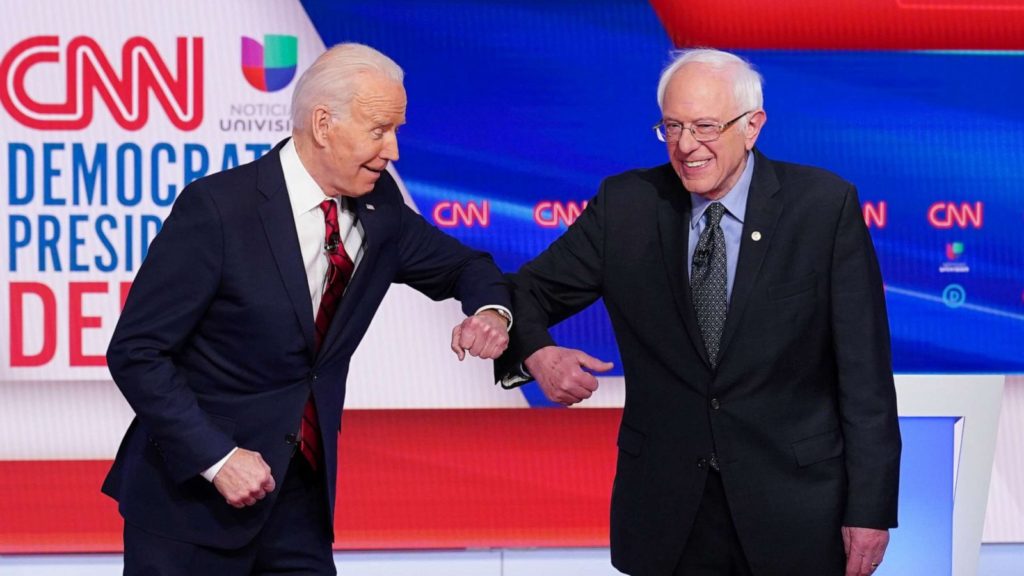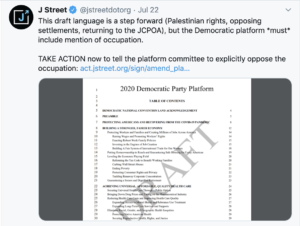FRESH AIR
The US Democratic party’s 2020 draft platform should somewhat reassure most supporters of Israel
July 25, 2020 | Jack Gross

The US is due for a Presidential election this November pitting incumbent Republican Donald Trump against former Vice-President Joe Biden for the Democrats. And with leftists and progressives, often with an explicit anti-Israel agenda, taking an increasingly important role in the Democratic party in the US, there has been some trepidation among supporters of Israel concerning what a Democratic administration under Biden might mean for US-Israel relations.
On July 23, the Democratic National Convention (DNC) released a rough draft of their 2020 party platform. And its provisions related to Israel should provide a measure of reassurance to most supporters of the Jewish state.
The platform does oppose any proposed Israeli “annexation” in the West Bank and support Palestinian rights, employing language not seen in the 2016 platform.
However, the platform reaffirms the Democratic Party’s commitment to supporting a strong US-Israel relationship. The document states, “Democrats believe a strong, secure, and democratic Israel is vital to the interests of the United States. Our commitment to Israel’s security, its qualitative military edge, its right to defend itself, and the 2016 Memorandum of Understanding is ironclad.”
The last point refers to an Obama Administration agreement with Israel setting and guaranteeing military aid levels, and is an implicit rebuke to some in the party’s left-wing who had called on the US to condition aid to Israel on concessions to the Palestinians, or end it all together.
Provisions of the draft platform oppose any unilateral action by either Israel or the Palestinians that may hurt the prospects of peacemaking, mentioning both annexations and the expansion of settlements. While the policy document does talk of supporting Palestinian rights, it doesn’t mention the word “occupation”, a key demand from the party’s progressive camp.
The document underlines the party’s commitment to bring an end to the Arab-Israeli conflict via a two-state outcome.
“We will work to help bring to an end a conflict that has brought so much pain to so many,” the document states. “We support a negotiated two-state solution that ensures Israel’s future as a Jewish and democratic state with recognized borders and upholds the right of Palestinians to live in freedom and security in a viable state of their own,” it continued.
Furthermore, the policy document states that Jerusalem should remain recognised as the capital of Israel. This is notable because some Democrats contested the decision made by the Trump Administration in May of 2018 to move the US Embassy from Tel Aviv to Jerusalem – despite a 1999 bipartisan US Congressional resolution which called for such a move.
The draft platform also asserts the party’s aspiration to restore US-Palestinian diplomatic relations and renew financial assistance to Palestinians in the West Bank and Gaza. The Palestinian Authority cut all diplomatic ties with the U.S. after it recognised Jerusalem as Israel’s capital, while the Trump Administration has ended virtually all forms of aid to the Palestinians.
Additionally, the party platform explicitly opposes any efforts to delegitimise or unfairly single out Israel in the United Nations or via the global Boycott, Divestment, and Sanctions Movement.
However, most supporters of Israel – along with others alamed about Iran’s aggressive behaviour, including virtually all Sunni Arab states – will likely be less pleased with elements of the document criticising the Trump Administrations decision to pull out of the Joint Comprehensive Plan of Action (JCPOA) nuclear deal with Iran. The JCPOA was strongly opposed as ineffective and even empowering to Iran by both the Israeli government and many Israeli and pro-Israel strategic analysts.
The draft platform says, “We believe the Joint Comprehensive Plan of Action (JCPOA) remains the best means to verifiably cut off all of Iran’s pathways to a nuclear bomb. The Trump Administration’s unilateral withdrawal from the JCPOA isolated us from our allies and opened the door for Iran to resume its march toward a nuclear weapons capacity that the JCPOA had stopped,” the document states. It follows by calling for a return to the Iran nuclear deal.
However, the platform does also highlight the importance of expanding efforts to address Iran’s ballistic missile program, regional aggression and its proxies, and domestic oppression – things which critics of the JCPOA have pointed out the deal left unaddressed.
The DNC’s Israel policy appears to align with presumptive 2020 Democratic Presidential Nominee Joe Biden’s recent public statements on the conflict and the Middle East. On a Zoom teleconference in May, Biden stated, “I’m going to reverse the Trump Administration’s steps that I think significantly undercut the prospects of peace.”
Most of the public comment on the draft document’s Middle East clauses to date comes from left-wing and progressive groups or activists disappointed the document did not better reflect progressive preferences.
Josh Orton, a senior advisor to Biden’s left-wing primary rival Senator Bernie Sanders, urged the platform committee to recognise and demand the end of Israel’s “occupation” in the West Bank. “Bottom line: the fact that Palestinians live under occupation is not a matter of serious dispute,” Orton stated. “It’s important to acknowledge this, because people living under occupation are afforded certain rights, and those rights must be upheld and protected.”
Leftist Mideast advocacy group J Street has called the document a “step forward”, but still not up to its standards. J Street has created a petition to urge the platform committee to oppose “occupation”.

J Street’s Tweet in response to the DNC’s 2020 policy platform.
Hady Amr, a former deputy special envoy for Israeli-Palestinian negotiations in the Obama administration, likewise acknowledged that the new platform went further than 2016’s, but that it still didn’t go as far as some would like.
“The 2020 Democratic Party Platform as it stands does represent progress over 2016, but progressives should continue to advocate for all people — including all residents of the Holy Land — to live with equal measures for freedom, security, prosperity and dignity,” he tweeted.
The final copy of the party platform is expected to be released next month at the party’s convention, and wrangling over its details may continue until then.
Tags: DNC, Israel, JCPOA, United States
RELATED ARTICLES

‘Time’s up for talk’: Joel Burnie discusses Antisemitism Envoy’s report on Sky News

‘Optimism’ for Hamas to ‘exile’ their power and create a permanent ceasefire with Israel: Joel Burnie on Sky News

Australian government’s response to Iran-Israel conflict ‘disappointing’: Paul Rubenstein on Sky News




















